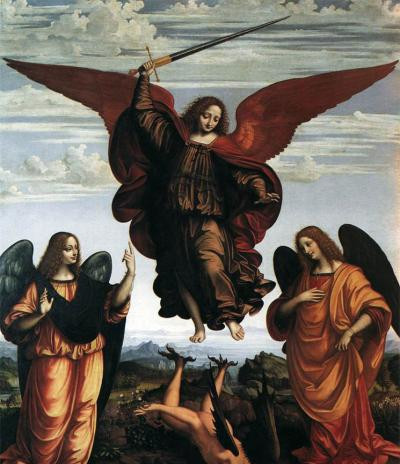
Saint of the Day for 29 September: Saints Michael, Gabriel and Raphael
The three archangels: history, meaning and cult
Name
Saints Michael, Gabriel and Raphael
Title
Archangels
Recurrence
29 September
Martyrology
2004 edition
Prayer
Come from Heaven into our homes the Angel of Peace, Michael, come the bearer of serene peace and banish to hell wars, the source of so many tears.
May Gabriel, the Angel of strength, come, chase away the ancient enemies and visit the temples dear to Heaven, which He, the triumphant, has raised on Earth.
May Raphael, the Angel who presides over health, assist us; may he come to heal all our sick and to direct our uncertain steps along the paths of life.
Patron Saint of
Certosa di Pavia, Castello dell’Acqua
Roman Martyrology
Feast of Saints Michael, Gabriel and Raphael, archangels On the day of the dedication of the basilica dedicated to St Michael, formerly built in Rome at the sixth mile of the Via Salaria, the three archangels, whose special missions are revealed in Sacred Scripture, are celebrated together: day and night they serve God and, contemplating his face, they glorify him unceasingly.
The Saint and Mission
Saints Michael, Gabriel and Raphael, known as the Archangels, represent emblematic and symbolic figures in Christian tradition, each with a distinctive mission that reflects different aspects of divine interaction with humanity. Their representation in sacred texts and tradition provides a rich picture of how the divine mission manifests itself in multiple and significant ways. St Michael, often portrayed as a celestial warrior, symbolises the struggle of good against evil. His mission is to protect, guide and defend justice, representing divine strength and determination against the forces of evil. His image evokes God’s constant presence in humanity’s struggle for justice and truth. St Gabriel, the herald, is the spirit of divine revelation and communication. Through his biblical appearances, his mission to connect the divine with the human, to proclaim crucial truths and to guide individuals through God’s messages is evinced. St Gabriel symbolises the voice of God that calls, informs and guides. St Raphael, the healer, represents God’s mission to bring healing, comfort and refreshment. His presence in biblical accounts, such as in the book of Tobias, highlights the compassionate and restorative dimension of the divine mission, offering hope and healing in times of suffering and despair. Together, these archangels illustrate the complexity and multiplicity of the divine mission. They show that God’s mission is not monolithic, but rich in different dimensions that respond to the multiple needs and challenges of human experience. They offer a picture of a God who is actively engaged in various ways in the life of humanity: defending justice, communicating truth and bringing healing. Reflection on the missions of the Archangels can inspire and deepen understanding of how the divine mission can manifest itself in everyday life. Their figures invite reflection on how each can participate in God’s broader mission, whether it is to fight for justice, communicate truth or bring healing and hope. In this sense, the Archangels are not just distant celestial beings, but living representations of how the divine mission can touch and transform human life in profound and lasting ways.
The Saint and Mercy
In the intricate fabric of Christian tradition, Archangels Michael, Gabriel and Raphael embody distinct aspects of divine mercy. Mercy, understood as God’s compassionate love for humanity, finds a vibrant resonance in the actions and narratives surrounding these celestial figures. St Michael, with his warrior aura, not only symbolises the struggle between good and evil, but also the merciful love of God expressed through the protection offered to the innocent and the justice exercised against evil. His figure evokes a God who is not indifferent to the challenges and sufferings of humanity, a God who intervenes to restore order and justice. St Gabriel, known as God’s messenger, represents a different aspect of divine mercy. Through his role as herald, Gabriel brings the light of knowledge and understanding in times of uncertainty or change. His appearance to Mary, announcing the birth of Christ, is a gesture of mercy that anticipates the coming of the Saviour, who will bring redemption and hope. St Raphael, the healer, exemplifies mercy through the act of bringing healing and comfort. In his journeys with Tobias, Raphael not only provides physical healing, but also emotional and spiritual comfort. Raphael shows that God’s mercy is a presence that soothes, restores and guides towards healing in a broad sense. Together, these Archangels remind us that God’s mercy is a tributary with multiple streams that permeate the human experience. Their stories call for reflection on how mercy manifests itself in the many expressions of love, protection, communication and healing. Each archangel, with his or her distinctive role, opens a window on the richness of divine mercy that pours out into the world in ways as varied as they are necessary. Meditating on mercy, through the lens of the Archangels’ missions, can offer a renewed perspective on how mercy can be experienced and reflected in everyday actions. They invite a merciful responsiveness that reconnects with God’s love, a love that extends beyond the boundaries of heaven to touch earthly realities with hope, justice and healing.
Hagiography
The Archangels, according to Dionysius the Areopagite, are high angelic hierarchies with specific tasks, including serving God, contemplating his face, ceaselessly singing his praises, fighting against Satan until his final defeat and helping man by bringing him God’s messages and…
